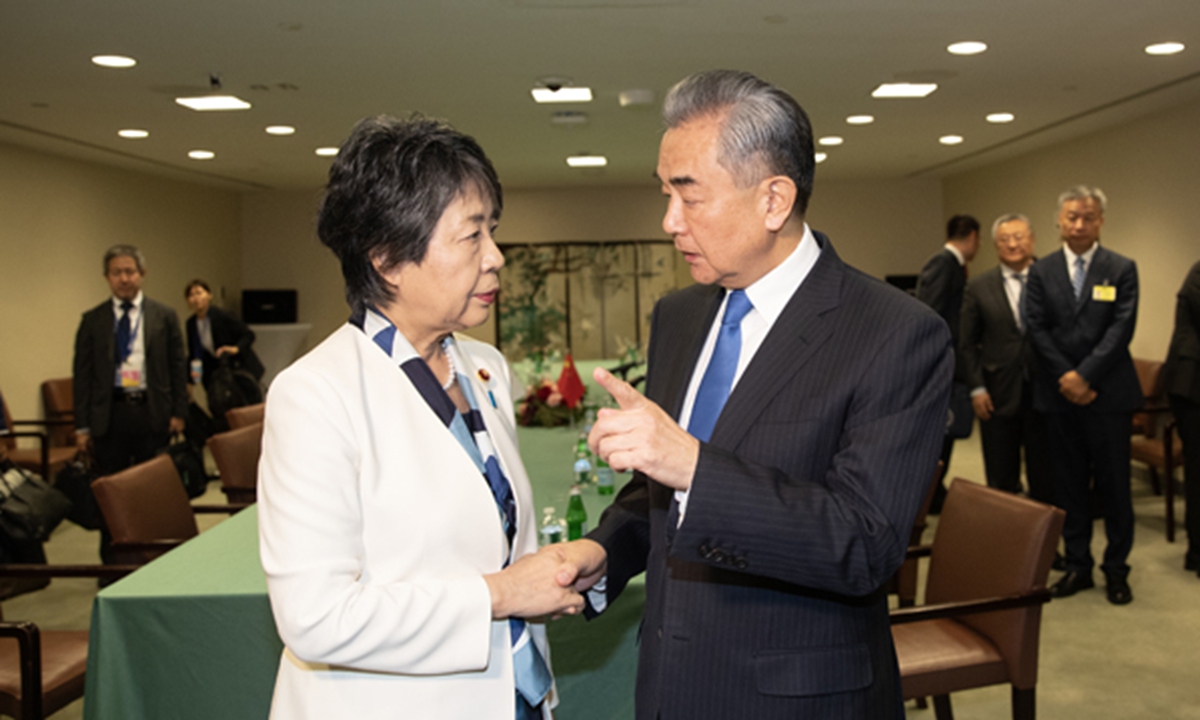
Chinese Foreign Minister Wang Yi meets Japanese Foreign Minister Yoko Kamikawa in New York on September 23, 2024. Photo: Chinese Foreign Ministry
Chinese and Japanese senior diplomats held talks on Monday regarding recent bilateral issues including the agreement on the discharge of Fukushima nuclear-contaminated water and the individual case involving the attack of a Japanese student in Shenzhen.
The Chinese side emphasized that the two countries share the responsibility of pushing for all-round progress in bilateral ties.
Commenting over the
high-level diplomatic exchanges between China and Japan, observers believe the interactions are beneficial for timely understanding of each other's positions and for strengthening positive and objective public guidance on recent issues.
During talks with Japanese Foreign Minister Yoko Kamikawa on Monday in New York, Chinese Foreign Minister Wang Yi, also a member of the Political Bureau of the Communist Party of China Central Committee, expressed hope that Tokyo will work with Beijing to keep to the right direction in growing their relationship, as defined as strategic and mutually beneficial relations, Xinhua News Agency reported on Tuesday.
Wang stated that comprehensively advancing the strategic mutually beneficial relationship between China and Japan is a shared responsibility of both sides. He hopes that Japan will work with China to grasp the correct direction of bilateral relations, implement the consensus reached by the leaders of both countries, and promote the healthy and stable development of China-Japan relations, according to a release published by China's Ministry of Foreign Affairs on Tuesday.
Kamikawa said that Japan attaches importance to developing relations with China and that in the face of rising risks and challenges in the international landscape, Japan and China should maintain communication and dialogue in various fields and at all levels through consultation and jointly safeguard regional peace and development.
She also voiced hope that China will properly handle the recent attack on a Japanese student in the southern Chinese city of Shenzhen and ensure the safety of the Japanese people in China as the important foundation of bilateral relations lies in people-to-people exchanges.
Wang stressed that China is justified to oppose the discharge of contaminated water from Japan's Fukushima nuclear disaster.
Since it has agreed to accept long-term international monitoring arrangements and independent sampling monitoring by stakeholders such as China, Japan should stick to its word and refrain from muddying the issue, Wang said.
As for the incident in Shenzhen, Wang said it was a single case which China will investigate and handle in accordance with law. China will, as always, protect the safety of all foreign citizens in China according to law.
The Japanese side should take a calm and rational approach toward the case instead of politicizing and amplifying the issue, Wang told Kamikawa.
Also on Monday, Chinese Vice Foreign Minister Sun Weidong met with Japan's State Minister for Foreign Affairs Yoshifumi Tsuge, according to the Chinese Foreign Ministry.
Sun expressed serious concerns over Japan's recent negative actions during the Quad leaders' summit and the Japan-US leaders' meeting, and urged Japan to be cautious in its words and actions regarding the Taiwan question and sea-related issues, embody the one-China principle in its actual policies and concrete actions, and refrain from being a troublemaker or instigator in the South China Sea.
Sun expressed regret and sadness over the death of the boy from the Shenzhen Japanese School, extended condolences to the boy's family, and emphasized that this was an individual case.
The Japanese side should not allow some media outlets and certain politicians to exacerbate tensions between China and Japan, Da Zhigang, director of the Institute of Northeast Asian Studies at Heilongjiang Provincial Academy of Social Sciences, told the Global Times on Tuesday.
However, according to The Sankei Shimbun, several candidates for the presidency of the Japanese ruling Liberal Democratic Party (LDP) have been sensationalizing this incident. Also, some Japanese media outlets hyped the so-called hatred and nationalism toward Japan on Chinese social media.
In reality, the vast majority of the Chinese public is shocked by the recent incident of attack on a Japanese student in Shenzhen and expressed condolences to the victim, Da noted.
Da also pointed out that the negative dynamics related to Quad leaders' summit and the Japan-US talks regarding China have contributed to discordant messages, creating obstacles to political, diplomatic, trade, and people-to-people exchanges between China and Japan, as well as negatively impacting regional peace and stability.




